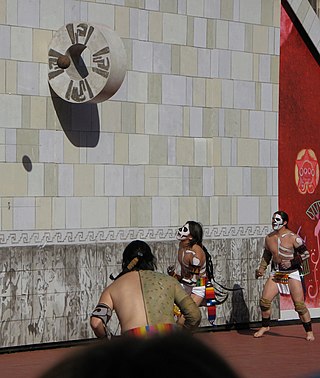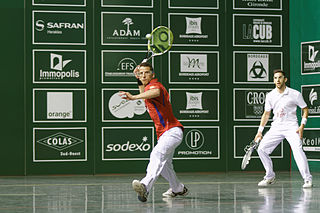Punt or punting may refer to:

Mesoamerican ballgame, Ollamaliztli, was a sport with ritual associations played since at least 1650 BC by the pre-Columbian people of Ancient Mesoamerica. The sport had different versions in different places during the millennia, and a modernized version of the game, ulama, is still played by the indigenous populations in some places.

Jeu de paume, nowadays known as real tennis, (US) court tennis or courte paume, is a ball-and-court game that originated in France. It was an indoor precursor of tennis played without racquets, and so "game of the hand", though these were eventually introduced. It is a former Olympic sport, and has the oldest ongoing annual world championship in sport, first established over 250 years ago. The term also refers to the court on which the game is played and its building, which in the 17th century was sometimes converted into a theatre.

Jai alai is a sport involving bouncing a ball off a walled-in space by accelerating it to high speeds with a hand-held wicker, commonly referred to as a cesta. It is a variation of Basque pelota. The term jai alai, coined by Serafin Baroja in 1875, is also often loosely applied to the fronton where matches take place. The game, whose name means "merry festival" in Basque, is called cesta-punta in the Basque Country. The sport is played worldwide, but especially in Spain, France, the U.S. state of Florida, and in various Latin American countries.

Basque pelota is the name for a variety of court sports played with a ball using one's hand, a racket, a wooden bat or a basket, against a wall or, more traditionally, with two teams face to face separated by a line on the ground or a net. The roots of this class of games can be traced to the Greek and other ancient cultures.

Frontenis is a sport that is played in a 30 meter pelota court using racquets and rubber balls. It can be played in pairs or singles, but only pairs frontenis is played in international competitions. This sport was developed in Mexico around 1900, and is accredited as a Basque pelota speciality.
Trinquete or trinquet can refer to the popular and shortened names for two different ball game courtfields:
Frontó is a modified Valencian pilota version of the original Basque Pelota game. The name frontó refers both to the game, ball and the playing area. Unlike some of the more popular Valencian Pilota rules, frontó is an indirect game, that is, players do not stand face-to-face but share a common playing area.

Pelota mixteca is a team sport similar to a net-less tennis game. The players wear sturdy, elaborately decorated gloves affixed to a heavy flat striking surface, using them to strike a small solid ball. The game has roots extending back hundreds, or perhaps thousands, of years.

A Basque pelota ball is a ball designed for the sport of Basque pelota, variations of the kind and size of balls are given by the peculiar category.
USS High Ball has been the name of more than one United States Navy ship, and may refer to:

Cestoball is a sport created in Argentina in 1897. During the conference in Buenos Aires and Santa Rosa in 1986, the sport changed the name to Cestoball with the purpose of making the old Argentine sport called 'pelota al cesto' more dynamic and to bring its rules into closer harmony with korfball and netball.
Wallball is a name given to several sports that involve hitting a ball off of a wall with one's hands or feet. It may refer to:

There is an abandoned Jai alai court in the back of the Hermanos Ameijeiras Hospital, the site of the old Casa de Beneficencia, on Calles Concordia and Lucenas near Calle Belascoain, an area that had been considered in the early part of the city as a place to locate the helpless and the unwanted, it was the edge of the city and the countryside known as the "basurero"; the spectator stands were parallel to Calle Concordia, the front wall of the court faced Calle Lucenas, east in the direction towards Old Havana. The original building has been annexed by five stories of residential concrete construction on the north side along Calle Virtudes. The Havana Jai alai fronton was known as "the palace of screams".
This page is based on this
Wikipedia article Text is available under the
CC BY-SA 4.0 license; additional terms may apply.
Images, videos and audio are available under their respective licenses.








